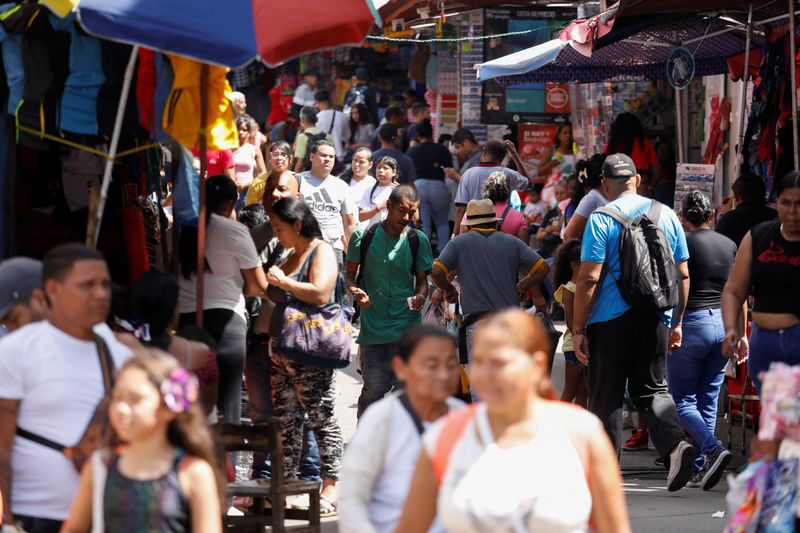
By Mayela Armas
CARACAS (Reuters) – Currency depreciation is set to reverse years of declining inflation in economically beleaguered Venezuela, public and private sector sources say, as foreign currency sales fall short of demand and the socialist government keeps tight-lipped about its strategy.
After years of hyperinflation and amid broad U.S. sanctions, in 2022 the administration of President Nicolas Maduro began using orthodox policies including credit restrictions, lower public spending, a fixed dollar-bolivar rate and central bank sales of billions of dollars in foreign currency to tamp down consumer prices.
Maduro, who will begin his third term in January after a disputed election that the opposition and international observers say he lost, has said his government defeated inflation of more than 100,000% and prices in 2024 are similar to those in 2014.
But the administration’s policy has now changed.
After more than nine months of the exchange rate being held at 36.5 bolivars to the dollar, the government in mid-October allowed the currency to float, beginning a depreciation that has seen the bolivar slide to about 45 versus the dollar, according to central bank figures.
Analysts say the over-valued currency made imports cheaper than locally-produced goods, impacting Venezuela’s private sector and helping push prices up by 12% in nine months.
The untethering of the exchange rate will also put upward pressure on prices in the final quarter of 2024, financial and business sources said, with analysts predicting in a LatinFocus survey the rate will end the year at 50 bolivars to the dollar.
Year-on-year inflation was 25% through September. Official figures for October have not yet been released.
“For nine months the depreciation of the currency was zero while inflation was rising, which exposed problems in the exchange scheme,” said economics professor and consultant Daniel Cadenas, who added the market depends on oil income. “For the system to function, there needs to be a growing source of exchange and that’s not possible.”
The government had predicted internally that inflation would close the year at 30%, two sources with knowledge of the projection said, but depreciation could increase the figure and local analysts have estimated inflation between 35% and 40%.
“There has been a necessary adjustment in the exchange rate that will have an impact on inflation,” said Asdrubal Oliveros, head of local think tank Ecoanalitica. “The government has understood it needs to devaluate.”
REDUCED CENTRAL BANK SALES
Vice President Delcy Rodriguez, who until recently also served as finance minister, told an event with business people last month that there must be “reflection” about the use of foreign exchange.
“We should all be concerned with how foreign exchange is used in imports. It is a subject the Finance Ministry is reviewing,” she said. “We need to take care of foreign exchange because this is a blockaded country and there cannot be cheap exchange for hair dye.”
Rodriguez’s comments are the only ones made on the subject by the government since devaluation began. Neither the central bank nor the communications or finance ministries responded to requests for comment.
Private sector demand for cheap foreign exchange increased during the nine months the rate was held, even as the quantity of dollars being injected into the market by the central bank was reduced, sources said.
In July the bank was offering some $800 million, but by October that figure had fallen to $400 million, according to calculations by local consultancy Sintesis Financiera.
The central bank did not respond to a question about the reduction.
“The strategy in exchange policy is not going ahead,” a government source said, without giving further details.

Food and medicine companies in Venezuela are allowed to pay for some of their goods with foreign currency, while other companies are given central bank promissory notes indexed to a specific exchange rate.
Two private sector sources said many businesses are eating through their inventories in the face of import difficulties.
This post is originally published on INVESTING.


